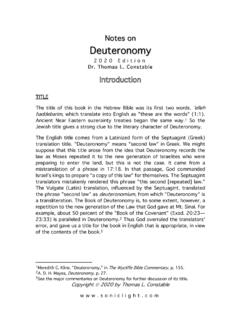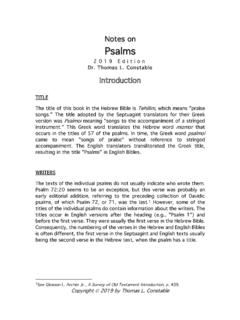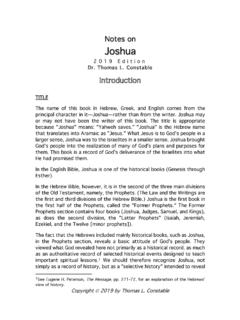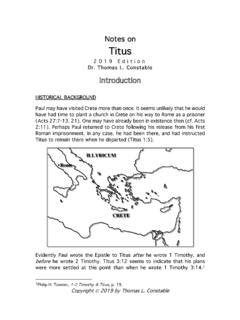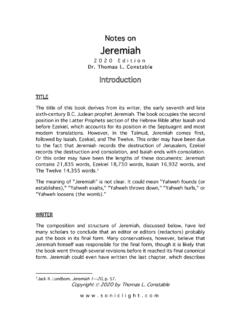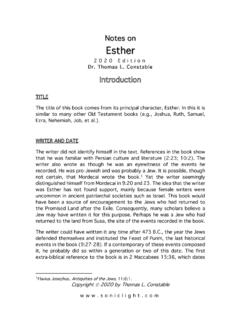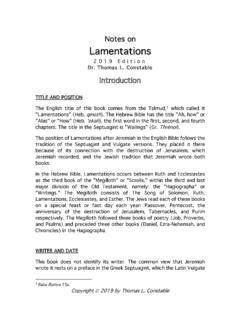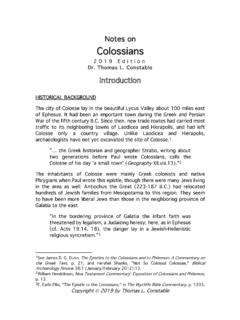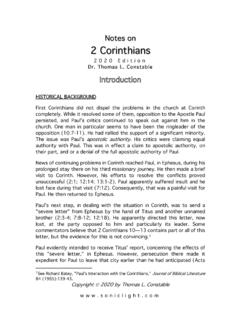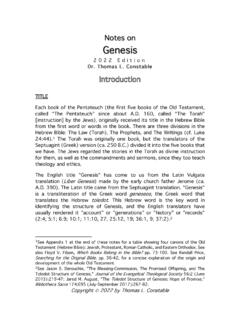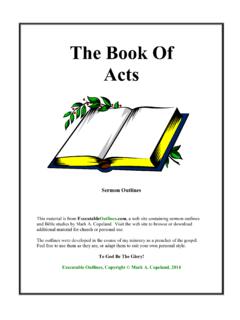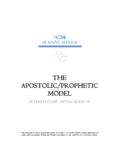Transcription of Notes on Acts - Plano Bible Chapel
1 Copyright 2021 by Thomas L. Constable Notes on acts 2021 Edition Dr. Thomas L. Constable TITLE The title " acts of the Apostles" is very ancient. The Anti-Marcionite Prologue to the Gospel of luke ( 150-180) contains the oldest reference to the book by this name. The title is a bit misleading, however, because the book contains only a few of the " acts " of some of the apostles, primarily Peter and Paul. The book is more a story of the extension of the church from Jerusalem to Rome than it is a complete history of the apostles' acts . Whereas Jesus is the chief character in the Gospels, the holy Spirit working through the apostles is in acts . WRITER Two lines of argument lead to the conclusion that luke , the friend, fellow missionary, and physician of Paul wrote this book, under the inspiration of the holy Spirit. First, there is the internal evidence, the passages written in the first person plural that can refer to luke (16:10-40; 20:5 21:18; 27:1 28:16).
2 Second, we have external evidence indicating that luke wrote acts . This evidence includes references by early church fathers,1 comments in collections of New Testament books,2 and editorial statements in early Notes on certain New Testament luke 's name does not appear in acts , but it is a shortened Greek form of a Latin name either Lucanus, Lucianus, Lucius, or Lucillus. Eusebius and Jerome wrote , Irenaeus, c. 180 , the Muratorian Canon, second century See Documents of the Christian Church, pp. 28-29, for an English translation of the text. , the Anti-Marcionite Prologue to the Gospel of luke , second century See T. W. Manson, Studies in the Gospels and Epistles, p. 49, for an English translation. 2 Dr. Constable's Notes on acts 2021 Edition that luke was a native of Syrian There is also some tradition that he was from DATE AND PLACE OF COMPOSITION The date of composition was probably in the early sixties, 60-63.
3 In view of his emphases, luke probably would have mentioned several important events had they occurred by the time he wrote. These include the Neronian persecution of Christians that began in 64, Paul's death in 68, and the destruction of Jerusalem in 70. We do not know for sure where luke was when he wrote acts . Perhaps he composed it over a period of years, drawing on various sources, and then put it into its final form in Rome where Paul was in confinement for two years (28:30-31; 60-62). "Fortunately the intelligibility and value of the book are largely independent of a knowledge of the precise situation in which it was written . While the finer points of the interpretation of acts can still cause intense discussion among scholars, the essential themes of the book are basically clear and simple."3 SCOPE The events recorded in acts cover a period of about 30 years: beginning with the Lord Jesus' ascension in 33, and extending to Paul's two-year Roman house arrest that ended about The Delphic Inscription and several references in Josephus, plus one in Suetonius, enable us to identify key dates in 1J.
4 S. Howson, in The Life and Epistles of St. Paul, p. 241. 2A. T. Robertson, Word Pictures in the New Testament, 2:x. 3I. Howard Marshall, The acts of the Apostles, p. 49. 4 See Appendix 1 at the end of these Notes for a table of Paul's activities. 5 See Darrell L. Bock, acts , p. 30, for a chart of these. 2021 Edition Dr. Constable's Notes on acts 3 GENRE Most scholars believe that acts fits within the literary classification of ancient history. The Greek word praxeis, " acts ," identifies a specific genre or subgenre in the ancient world: narratives of the heroic deeds of individuals or cities. However, it was not the name of a technical genre as acts bears all the marks of a book of ancient history. luke was on a par with other writers of ancient history in his day regarding his skill and PURPOSE There seems to have been a three-fold purpose for the writing of acts . As with the other books of the Bible that record history in narrative form, certainly the holy Spirit had a historical He intended to provide an inspired record of selected events that show the spread of the gospel and the church.
5 They branched out from Jerusalem, the center of Judaism where the church began, to Rome, the uttermost part of the Gentile earth in luke 's day. "This book may be called an account of the beginning of the bringing of God's supply to humanity to meet its need."4 "Streeter suggested that an alternative title for the book of acts might be 'The Road to Rome', for this is indeed the significance of luke 's work. Whatever minor motifs luke had in mind, such as the establishment of Christianity in men's minds as a constructive and not destructive element in the social order, his main concern was to show that, in God's plan for the renewal of the life of mankind, Jerusalem, the heart of old Israel, was the goal of Stage I [ , the Book of luke ], while Rome, the centre of the world, was the goal of Stage II [ , the Book of acts ]."5 1 Donald A. Carson and Douglas J. Moo, An Introduction to the New Testament, pp.
6 285, 300-01. 2 Ibid., pp. 316-21. 3 William Barclay, The acts of the Apostles, p. xvii. 4G. Campbell Morgan, The Unfolding Message of the Bible , p. 334. 5 William Neil, The acts of the Apostles, p. 27. 4 Dr. Constable's Notes on acts 2021 Edition However, the fact that luke included what he did, and omitted much other historical data, indicates a second, theological purpose. He showed how the plans and purposes of God were working out through history. In particular, he showed how Jesus Christ was faithfully and irresistibly building His church (Matt. 16:18).1 This involved clarifying how God's dealings with humankind had taken a different course because of the Jews' rejection of their ".. luke in acts is not merely concerned to draw a link between the time of Jesus and the time of the early church, as is commonly noticed, but also between the time of Israel and the time of Jesus and His church.
7 acts insists that the God who was at work in the history of his ancient people, Israel, bringing them salvation, is the same God who is at work in the church."3 Third, luke evidently had an apologetic purpose in writing. He frequently pointed out the relationship of the church to the Roman state by referring to many Roman officials, not one of whom opposed Christianity because of its doctrines or practices. This would have made acts a powerful defensive tool for the early Christians in their struggle to survive in a hostile pagan environment. Longenecker identified luke 's purposes as kerygmatic, apologetic, conciliatory, and "I propose that forging a vision for what life could be like in the gathered church, while certainly not his only priority and perhaps not his highest, was clearly one of luke 's major concerns in writing acts .. I believe luke deliberately chose positive aspects of church life for inclusion in the summary narratives [2:42-47; 4:32-35; and 5:12-16].
8 He did this in order to present his portraits of church life as a positive 1 See Stephen J. Strauss, "The Purpose of acts and the Mission of God," Bibliotheca Sacra 169:676 (October-December 2012):443-64. 2 For a very good discussion of the major theological emphases in acts , see Marshall, pp. 23-34. 3 Brian S. Rosner, " acts and Biblical History," in ibid., p. 82. Cf. George E. Ladd, "The acts of the Apostles," in The Wycliffe Bible Commentary, pp. 1123-24. 4 Richard N. Longenecker, " acts ," in John- acts , vol. 9 of The Expositor's Bible Commentery, pp. 216-21. 2021 Edition Dr. Constable's Notes on acts 5 example for readers to study and emulate in their own churches. For luke , the summary narratives describe what life could be like in an exemplary church."1 "We agree with a growing number of scholars who think that luke wrote with a variety of specific purposes and that these purposes are part of a larger, general purpose the edification of Christians.
9 "2 UNIQUE FEATURES acts is the only New Testament book that continues the history begun in the Gospels. Whereas luke 's Gospel focuses on the vertical universalization of the gospel (up and down the social scale), acts focuses on its horizontal universalization (from Jerusalem to the uttermost parts of the world). ".. the acts is to be seen in close literary association with the Gospel [of luke ]. They form two parts of one work, conceived in its final form as a unity, whether or not the original composition of the Gospel took place independently of the plan to produce the two-part work. Although there are other examples of literary compositions in two parts (Josephus, Contra Apionem, is one of the nearest parallels to luke - acts in time and cultural context), luke 's work appears to be unique among Christian writings and to have no close secular precedents in its combination of the stories of a religious leader and of his followers.
10 "3 "The book which we call the acts of the Apostles may be said to complete the Pentateuch of New Testament history. Four of these books present the Person of our Lord; while the fifth gives the first page of the history of the Church .."4 "This book is to the Gospels what the fruit is to the tree that bears it. In the Gospels we see the corn of wheat falling into 1 Andy Chambers, Exemplary Life, p. 5. 2 Carson and Moo, p. 305. 3I. Howard Marshall, " acts and the 'Former Treatis,'" in The Book of acts in Its First Century Setting; Vol. 1: The Book of acts in Its Ancient Literary Setting, p. 182. 4G. Campbell Morgan, The acts of the Apostles, p. 9. 6 Dr. Constable's Notes on acts 2021 Edition the ground and dying: in the acts we see it bearing forth much fruit (John 12:24)."1 acts is also an indispensable historical record for understanding the apostle Paul's epistles; without it we could not understand some of the things he wrote.
